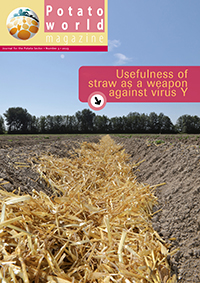Already a subscriber? Activate your premium account

Potatoworld Magazine

Phytophthora is a difficult problem to deal with. Especially for organic farming where no synthetic crop protection products may be used, which is why Bionext has labeled a first generation of resistant varieties as ‘Robust’. This sounds promising, but there is still a great danger in this approach. The first generation of resistant varieties is based on only one (solo) resistant gene, which means that there is only one lock on the Phytophthora door while Phytophthora is a master burglar.
Login or create an account
You must be logged in to read the rest of this article
Not yet registered? Create a free account.
In order to continue reading we ask you to create a free account.
Events
©2015 - 2024 Potatoworld | Webdesign and realisation COMMPRO